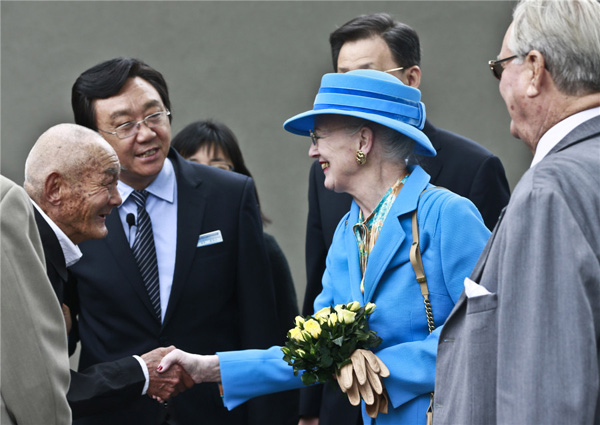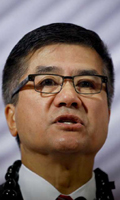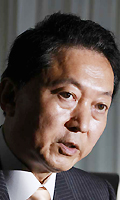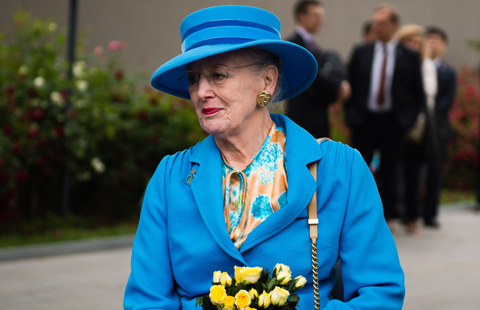Danish queen visits Nanjing memorial hall
Updated: 2014-04-28 07:16
By Zhao Shengnan in Beijing and Cang Wei in Nanjing (China Daily)
|
|||||||||||
|
 Queen Margrethe II of Denmark shakes hands with a survivor of the Nanjing massacre during her visit to the Memorial Hall of the Victims in Nanjing Massacre by Japanese Invaders, in Nanjing, capital of east China's Jiangsu province, April 27. [Feng Yongbin/China Daily] Click for more photos |
Recognition paid to young Dane who helped Chinese survive massacre
Queen of Denmark Margrethe II's five-day trip to China continued with a special arrangement on Sunday: She became the
|

 |
Observers said the rare visit underscored the support from Denmark, also a victim of World War II.
She said the hall recorded the darkest history of the city, and although history cannot be changed, lessons can be learned to face the future.
The hall commemorates the more than 300,000 Chinese killed by Japanese soldiers after they occupied the city, then the Chinese capital, on Dec 13, 1937.
Inside the memorial hall, the queen and her husband, Prince Consort Henrik of Denmark, visited the corridor adorned with photographs depicting Bernhard Sindberg, a Dane who helped save up to 20,000 Chinese during the massacre that lasted for 107 days.
Sindberg, along with German colleague Karl Gunther, established a camp for Chinese inside the Jiangnan Cement Factory, run by a Danish firm. They also set up a small field hospital for the wounded and tried to provide food and other supplies to the refugees.
"Sindberg was a witness of the Nanjing Massacre and was one of the foreign friends who protected Chinese refugees," Zhu Chengshan, curator of the memorial hall, told the queen.
Outside the corridor, a memorial hall worker played a song on the piano composed to memorialize Sindberg: Nanjing Forever - Sindberg Roses. The yellow roses were cultivated in Aarhus, Sindberg's hometown, in 2004, and were later presented to the memorial hall by the Danish embassy to China.
The queen and the prince also watered the Tree of Peace at Peace Square in the memorial hall. She placed a yellow rose in the earth under the tree.
Su Guobao, a survivor of the massacre, told the queen that he lived in the refugee camp as a 10-year-old.
"My family survived because we received a silver coin and some rice from Mr Sindberg," said Su, now 87.
"I always remember his help. Thank you Sindberg and Denmark. I hope the friendship between China and Denmark will last forever."
Mariann Stenvig, Sindberg's niece, who joined the Danish delegation, said: "We are so proud of Sindberg for his courage during the wartime to save people's lives."
"After he gave me a silk banner reading 'Good Samaritan' given by the refugees, I presented it to the hall for people to better remember history," she said.
Zhen Jianguo, former Chinese ambassador to Denmark, said it is not surprising that the queen became the first sitting head of state to visit the hall due to the country's history and close ties with China.
"Denmark highly values independence and sovereignty, and this tradition is especially evident in the queen, who was born in 1940 when the country was under German occupation," he said.
"By highlighting Sindberg's story, the visit brings tens of thousands of people in China and Denmark together," Zhen said.
Feng Zhongping, vice-president of the China Institutes of Contemporary International Relations, said the queen's visit to the hall would help Europeans improve their knowledge about the history of World War II in East Asia.
Unlike Europe, which has gone through a thorough discussion and reflection about the war, Asian countries have not properly settled the historical problems, Feng said.
"Asia's, including China's, contribution to victory in WWII should not be forgotten, and the queen's visit will help Europeans better know the truth," he said.
The queen is scheduled to conclude her second visit to China on Monday. In September 1979, she was the first Western head of state to visit China after the country's reform and opening-up policy.
Contact the writers at zhaoshengnan@chinadaily.com.cn and cangwei@chinadaily.com.cn
Today's Top News
Swiss move to reveal bank accounts will help China
Chinese police to patrol in Paris
Beijing rebuffs Hanoi's oil rig claims
Key Sino-Nigerian deals signed
EU: No armed intervention in Ukraine
Chinese premier visits Nigeria
Court to rule on Yingluck in Thailand
Travellers to Malaysia drop
Hot Topics
Lunar probe , China growth forecasts, Emission rules get tougher, China seen through 'colored lens', International board,
Editor's Picks

|

|

|

|

|

|





